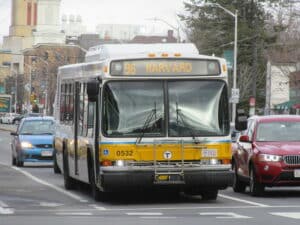New MBTA employees could receive hiring bonuses under a collective bargaining agreement officials ratified Thursday, one of several steps the transit agency’s leaders are taking to attract workers amid a staffing shortage set to impact bus service.
The contract with Boston Carmen’s Union Local 589, the largest union representing MBTA workers, allows officials for the first time to offer bonuses of a still-unspecified amount to help entice new operators.
MBTA General Manager Steve Poftak said the hiring bonuses, which the T’s board of directors approved 4-0 as part of the collective bargaining agreement, will serve as “an important tool in our toolkit going forward as we seek to address shortages in our workforce.”
Officials will also pay a higher training wage to MBTA recruits receiving their commercial driver’s licenses, promote dozens of drivers from part-time to full-time, and pivot away from an application lottery system to screen everyone interested in a position at the T.
In previous years, the MBTA has used a lottery to pare down a pool of job-seekers far greater than the number of available positions. A spokesperson said one human resources employee recalled that a 2009 lottery list drew more than 33,000 candidates for jobs and remained in use until at least 2016.
But like transit agencies and transportation companies around the country, the pandemic has created major staffing challenges at the T. Officials estimate the agency is about 80 to 100 bus drivers short of being able to run its fall schedule without dropping trips.
“As a board and as an organization, we all need to be aware of the demand problem that’s larger than just the MBTA. It will require all of us to be open to identifying what works and make us as attractive as an employer can be,” Transportation Secretary Jamey Tesler said Thursday. “The demand for that lottery system no longer exists.”
A winter service schedule that took effect Sunday pared back frequency on bus routes across the system, including several key routes, in response to the workforce shortage. The total number of trips cut amount to 3 percent of all scheduled trips system-wide. Subway schedules are not affected.
Officials are hopeful that scheduling fewer trips will help address reliability issues exacerbated by the lack of drivers. Poftak as an example suggested a route could run with consistent 12-minute headways between buses, rather than 10-minute headways that sometimes become 20 minutes when the agency drops a trip because of its staffing levels.
He stressed that the changes are “not a budgetary exercise.”
“We are fully budgeted for a full level of service,” Poftak said. “We would dearly like to be providing that service and spending that money. Unfortunately, right now we are having staffing challenges as is — frankly, every major transportation entity in the country is dealing with this.”
The agency more than doubled the size of its recruiting team, Poftak said, and promoted 75 part-time bus operators to full-time to help retain them.




 |
| 


